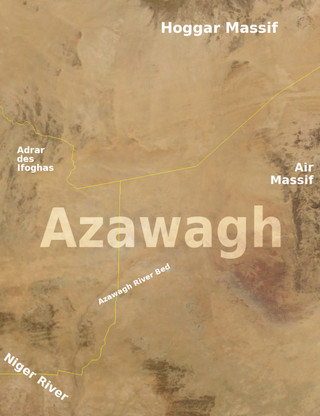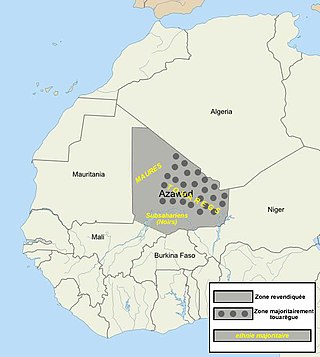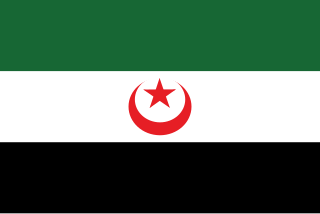Related Research Articles

Azawad, or Azawagh, was a short-lived unrecognised state lasting from 2012 to 2013. Azawagh (Azawaɣ) is the generic Tuareg Berber name for all Tuareg Berber areas, especially the northern half of Mali and northern and western Niger. The Azawadi declaration of independence was declared unilaterally by the National Movement for the Liberation of Azawad (MNLA) in 2012, after a Tuareg rebellion drove the Malian Armed Forces from the region.

From 1990 to 1995, a rebellion by various Tuareg groups took place in Niger and Mali, with the aim of achieving autonomy or forming their own nation-state. The insurgency occurred in a period following the regional famine of the 1980s and subsequent refugee crisis, and a time of generalised political repression and crisis in both nations. The conflict is one in a series of Tuareg-based insurgencies in the colonial and post-colonial history of these nations. In Niger, it is also referred to as the Second or Third Tuareg Rebellion, a reference to the pre-independence rebellions of Ag Mohammed Wau Teguidda Kaocen of the Aïr Mountains in 1914 and the rising of Firhoun of Ikazkazan in 1911, who reappeared in Mali in 1916. In fact the nomadic Tuareg confederations have come into sporadic conflict with the sedentary communities of the region ever since they migrated from the Maghreb into the Sahel region between the 7th and 14th centuries CE. Some Tuareg wanted an independent Tuareg nation to be formed when French colonialism ended. This, combined with dissatisfaction over the new governments, led some Tuareg in Northern Mali to rebel in 1963.

Agadez Region is one of the seven regions of Niger. At 667,799 square kilometres (257,839 sq mi), it covers more than half of Niger's land area, and is the largest region in the country, as well as the largest African state subdivision. The capital of the department is Agadez.
Orano Cycle, formerly COGEMA and Areva NC, is a French nuclear fuel company. It is the main subsidiary of Orano S.A. It is an industrial group active in all stages of the uranium fuel cycle, including uranium mining, conversion, enrichment, spent fuel reprocessing, and recycling.
The Islamic Legion was a Libyan-sponsored pan-Arabist and pan-Islamist paramilitary force, created in 1972. The Legion was part of Muammar Gaddafi's dream of creating the Great Islamic State of the Sahel.

The Azawagh is a dry basin covering what is today the northwestern Niger, as well as parts of northeastern Mali and southern Algeria. The Azawagh is mainly made up of Sahelian and Saharan flatlands and has a population that is predominantly Tuareg, with some Arabic-speaking and Wodaabe minorities and a recent influx of Hausa and Zarma.

The 2007-2009 Tuareg rebellion was an insurgency that began in February 2007 amongst elements of the Tuareg people living in the Sahara desert regions of northern Mali and Niger. It is one of a series of insurgencies by formerly nomadic Tuareg populations, which had last appeared in the mid-1990s, and date back at least to 1916. Populations dispersed to Algeria and Libya, as well as to the south of Niger and Mali in the 1990s returned only in the late 1990s. Former fighters were to be integrated into national militaries, but the process has been slow and caused increased resentment. Malian Tuaregs had conducted some raids in 2005–2006, which ended in a renewed peace agreement. Fighting in both nations was carried on largely in parallel, but not in concert. While fighting was mostly confined to guerrilla attacks and army counterattacks, large portions of the desert north of each nation were no-go zones for the military and civilians fled to regional capitals like Kidal, Mali and Agadez, Niger. Fighting was largely contained within Mali's Kidal Region and Niger's Agadez Region. Algeria helped negotiate an August 2008 Malian peace deal, which was broken by a rebel faction in December, crushed by the Malian military and wholescale defections of rebels to the government. Niger saw heavy fighting and disruption of uranium production in the mountainous north, before a Libyan backed peace deal, aided by a factional split among the rebels, brought a negotiated ceasefire and amnesty in May 2009.
The Nigerien's Movement for Justice is a largely Tuareg ethnic, northern Niger based militant group. But the MNJ also includes other nomadic ethnicities, within this area, such as the Toubou and the Fulani have also joined the group, which has been battling the Niger government since 2007.

Tishoumaren or assouf, internationally known as desert blues, is a style of music from the Sahara region of northern and west Africa. Critics describe the music as a fusion of blues and rock music with Tuareg, Malian or North African music. Various other terms are used to describe it including desert rock, Saharan rock, Takamba, Mali blues, Tuareg rock or simply "guitar music". The style has been pioneered by Tuareg musicians in the Sahara region, particularly in Mali, Niger, Libya, Western Sahara, Algeria, Burkina Faso and others.
Andéramboukane is a town and cercle in Ménaka Region, Mali. It lies at the extreme east of the country, several kilometers north of the Nigerien border. It was previously a commune in Ménaka Cercle but was promoted to the status of a cercle when Ménaka Region was implemented in 2016.

The 2012 Tuareg rebellion was the early phase of the Mali War; from January to April 2012, a war was waged against the Malian government by rebels with the goal of attaining independence for the northern region of Mali, known as Azawad. It was led by the National Movement for the Liberation of Azawad (MNLA) and was part of a series of insurgencies by traditionally nomadic Tuaregs which date back at least to 1916. The MNLA was formed by former insurgents and a significant number of heavily armed Tuaregs who fought in the Libyan Civil War.

The National Movement for the Liberation of Azawad or the Azawad National Liberation Movement, formerly the National Movement of Azawad, is a terrorist organization based in northern Mali.
The Movement for Oneness and Jihad in West Africa or the Movement for Unity and Jihad in West Africa, was a militant Islamist organisation that broke off from Al-Qaeda in the Islamic Maghreb with the intended goal of spreading jihad across a larger section of West Africa, as well as demanding the expulsion of all French interests that operates in West Africa, which they regard as "colonialist occupiers".

Ansar Dine (Arabic: أنصار الدين ʾAnṣār ad-Dīn, also transliterated Ançar Deen; meaning "helpers of the religion" also known as Ansar al-Din was a Salafi jihadist group led by Iyad Ag Ghaly. Ansar Dine sought to impose absolute sharia across Mali. The group took over the city of Timbuktu in 2012, which prompted the French-led intervention, Operation Serval.
Mohamed Ag Najem is an Azawadi colonel, who is the chief of staff of the National Movement for the Liberation of Azawad (MNLA) army.

The Mali War is an ongoing conflict that started in January 2012 between the northern and southern parts of Mali in Africa. On 16 January 2012, several insurgent groups began fighting a campaign against the Malian government for independence or greater autonomy for northern Mali, which they called Azawad. The National Movement for the Liberation of Azawad (MNLA), an organization fighting to make this area of Mali an independent homeland for the Tuareg people, had taken control of the region by April 2012.

The Arab Movement of Azawad is an Arab military organization active in Azawad/northern Mali. Initially known as the National Liberation Front of Azawad, it was formed in early 2012, during the 2012 Tuareg rebellion. The MAA claims to be a secular, non-terrorist organization, whose main objective is to defend the interests of all the Arab peoples of northern Mali.

An Islamist insurgency has been ongoing in the Sahel region of West Africa since the 2011 Arab Spring. In particular, the intensive conflict in the three countries of Mali, Niger and Burkina Faso has been referred to as the Sahel War.
Hassan Ag Fagaga, born around 1959 or 1966, in Kidal, Mali, was a Malian soldier and a Tuareg rebel.
Libya–Mali relations are the bilateral relations between Libya and Republic of Mali. The two countries are members of the African Union, Group of 77 and the United Nations.
References
- ↑ "Orphans of the Sahara documented on Al Jazeera". www.screenafrica.com. Retrieved 2016-05-14.
- ↑ Al Jazeera Network (23 January 2014). "Uranium mining in Niger: AREVA responds". aljazeera.com. Al Jazeera.